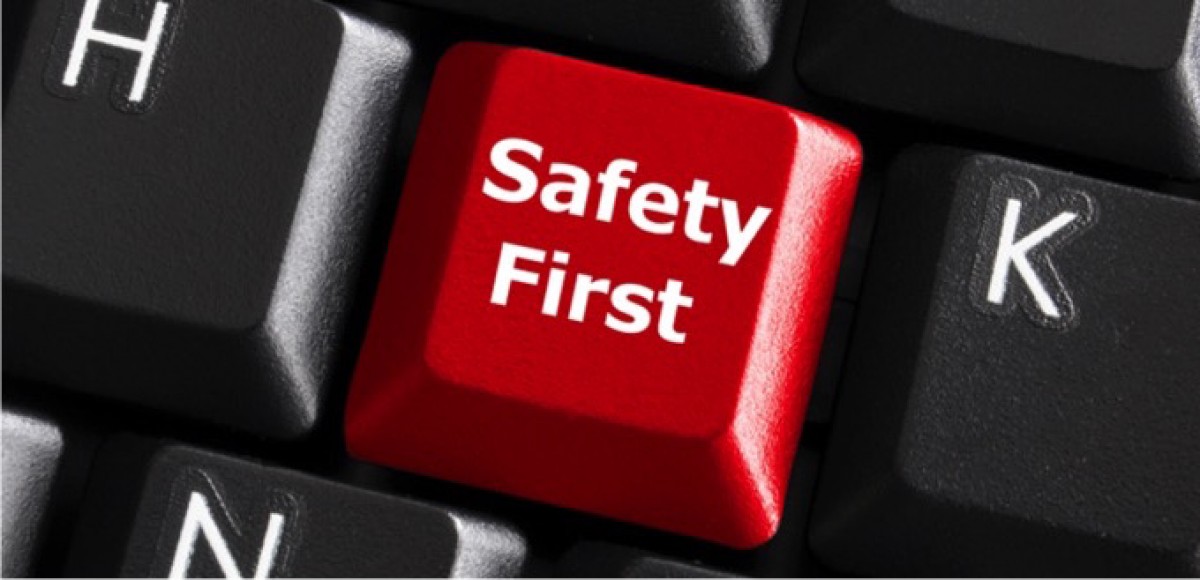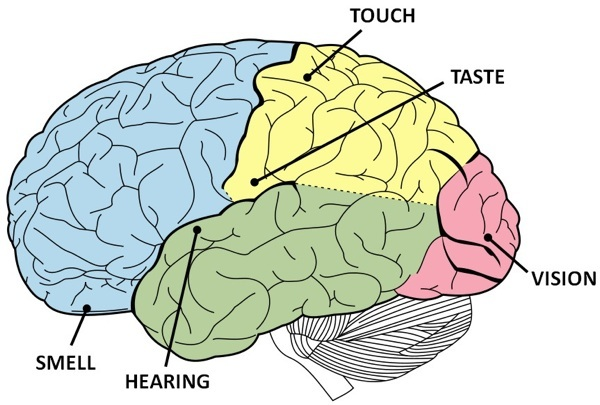Most humans are born with five senses; sight, hearing, touch, taste and smell. Those who are not, generally have stronger senses to support the absent sense (for example, those who are blind have more efficient hearing to help them obtain a better idea of their surroundings). We begin to learn about our senses even before begin to walk and later are taught about them in elementary school. No matter how important our senses are, though, it’s easy to take them for granted because they are such a basic part of our lives.
Your senses are the first key to your safety. Your sense of smell can alert you to a fire, your sense of touch can alert you to hot surfaces to avoid burns, your hearing lets you know if a vehicle is speeding up behind you, your vision can spot danger even to your left or right and so much more!
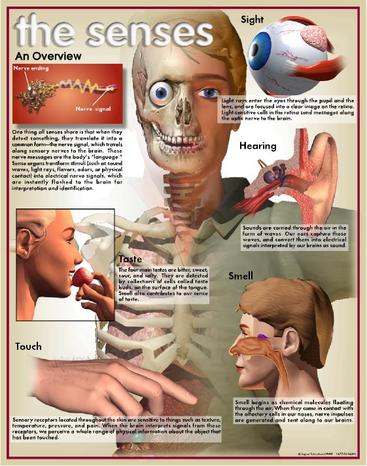
Here are some key elements to help you get the most of your senses!
SIGHT:
- Stay alert and pay attention to your surroundings.
- Do not wear eyewear that can block your peripheral vision.
- Wear protective eyewear whenever you are exposed to UV rays or bright light.
- Have your vision checked regularly by an optometrist.
- Wash your hands before touching your eyes.
- Follow the proper prescription instructions for contact lenses or eye glasses.
- Wear safety glasses whenever working in elements such as welding, building, or any environment that could blow dust or particles into your eyes.
- Avoid tobacco use.
- Eat healthy – Fruits, Green leafy vegetables, and fish high in Omega-3 fatty acids are best.
- Give your eyes proper rest – If you spend a lot of time at the computer or focusing; Every 20 minutes look away about 20 feet in front of you for 20 seconds (Known as “The 20-20-20 Rule”).
HEARING:
- Avoid loud levels of equipment noise, music, vehicles etc by wearing ear plugs.
- STOP using cotton swabs to clean your ears! A little bit of wax in your ears is not only normal, but it’s also important. The ears are self-cleaning organs, and wax stops dust and other harmful particles from entering the canal. Plus, inserting anything inside your ear canals risks damaging sensitive organs like your ear drum.
- Keep your ears dry. Excess moisture can allow bacteria to enter and attack the ear canal. This can cause swimmer’s ear or other types of ear infections, which can be dangerous for your hearing ability. Be sure you gently towel-dry your ears after bathing or swimming. If you can feel water in the ear, tilt your head to the side and tug lightly on the ear lobe to coax the water out.
- Discuss your medications with your physician. Certain medications, such as non-steroidal anti-inflammatory drugs (NSAIDS) like aspirin, ibuprofen and naproxen, can sometimes contribute to hearing loss.
- Stress and anxiety have been linked to both temporary and permanent tinnitus (a phantom ringing in the ears). High levels of stress fills your body with adrenaline to help you either fight or flee from danger. This pressure and stress can travel up into your inner ear and contribute to tinnitus symptoms.
- Cardio exercises like walking, running, or cycling gets the blood pumping to all parts of your body, including the ears. This helps the ears’ internal parts stay healthy and working to their maximum potential.
- Ask your primary care physician to incorporate hearing screenings into your regular checkups. Because hearing loss develops gradually, it’s also recommended that you have annual hearing consultations with a hearing healthcare professional.
SMELL:
- If you experience a diminished or absent sense of smell, see your physician to be checked for a disorder called anosmia which is usually a result of head trauma or damage to your frontal lobes.
- Be sure to only use nasal sprays and similar products that are medically approved by the FDA and be sure to blow your nose regularly to keep your nerve receptors free from obstructions.
- Avoid extensive exposure to bad smells. Extended periods of inhaling a bad smell can cause permanent damage to your sense of smell. If you must be exposed to a bad smell for a long period, be sure to wear a protective mask.
- Do not ignore your sense of smell when it alerts you that something isn’t quite right.
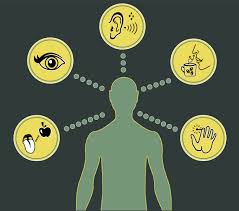 Smelling provides a warning for toxic fumes, smoke, leaking natural gas, spoiled food, and dangerous environments.
Smelling provides a warning for toxic fumes, smoke, leaking natural gas, spoiled food, and dangerous environments. - Wear your seatbelt! A common cause of loss of smell is automobile accidents, even low-speed crashes. Any impact can shift the brain within your skull, tearing delicate nerve fibers that connect your nose to your brain.
- Get a little exercise in each day. Go for a brisk, 10-minute walk or run. Our sense of smell is higher after exercise. Researchers suspect it might be related to additional moisture in the nose.
- Hundreds of medications affect taste and smell. Make a list of your medications and talk to your doctor about possible side effects if you’re concerned about losing your sense of smell.
- Long-term smoking can even permanently damage the olfactory (a.k.a., sniffing) nerves in the back of your nose. If you are a smoker and are experiencing loss of smell, this could be the cause.
TASTE:
- Serve food that looks like it tastes. If you’re serving fish, keep it looking like a fish. Your sense of taste is stronger if your brain can connect what you’re eating with how it looks.
- Drink a glass of water every hour or so. Dry mouth — whether due to medication or simply dehydration — can adversely affect your sense of taste.
- Add zinc to your life through your diet and/or supplements. Zinc deficiencies contribute to loss of taste as well as smell.
- Tobacco use directly contributes to loss of taste by damaging your taste buds. If you are a long term smoker experiencing loss of taste, this could be the cause.
- Chew your food thoroughly and slowly. This releases more flavor and extends the time that the food lingers in your mouth so it spends more time in contact with your taste buds.
- Reset your taste for sugar and salt by cutting them out for at least a week. Processed foods have so much sugar and salt that you’ll practically stop tasting them if you eat these foods often.
- Avoid very hot foods and fluids. They can damage your taste buds.
- Note that your sense of taste and smell work together. The advise given for your sense of smell works with your taste as well, just as this advice for your taste works with your sense of smell.
TOUCH:
- The sense of touch is vulnerable to the effects of age. The touch sense steadily deteriorates as we get older. Starting around the age of 18, every year we lose around one percent of our tactile sense.
- Myelin, the natural insulation that coats your fast-conducting nerve fibers (in touch) and makes them project quickly to the brain, breaks down so the information gets to your brain more slowly. Maintaining a diet high in Omega 3 Fatty acids helps your body battle against the breakdown of Myelin.
- Part of the reason that elderly people are so prone to falls is that they are getting less tactile information from the soles of their feet. One of the ways for the elderly to combat falling is actually to go barefoot so that they have a better sense of the ground.
- The sense of touch also helps to alert people to injuries they have incurred. The sensation of pain helps to alert people to physically traumatic stimuli so that they can rectify the problem. Do not ignore pain when you feel it!
- Take care of your liver because it filters the agents dangerous to your nerve endings as well as many other systems in your body that keep you well. Damaged nerve endings directly result in losing one’s sense of touch. One of the best ways to protect your liver is to avoid excessive alcohol intake.
- Often lack of proper blood supply causes demyelination, a condition that can in cases of heart attack, suffocation, drug overdose or carbon monoxide poisoning. If you are experiencing a diminished sense of touch, have your blood tested by your physician.
- As always, what you eat directly effects your senses. Your sense of touch is harmed by a large intake of saturated fats and refined sugar as well as not eating a substantial amount of essential fatty acids, vegetables, fruits and vitamin C.
- Exercise stimulates a strong influence in general body functions, helps the brain to be well oxygenated and releases tension which directly effects your sense of touch.
- Water is a great conductor of electrical impulses so your diet should not miss at least 2 liters of pure water per day.
- Toxins, such as cigarette smoke, directly damage your nerves over extended exposure. It’s best to avoid smoking and second hand smoke.
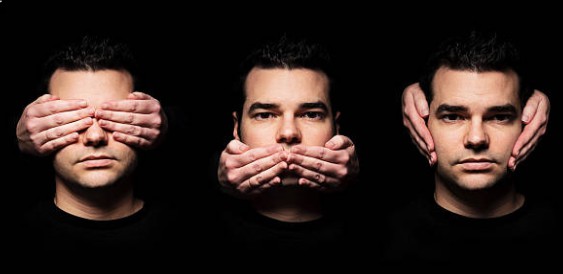
Protecting and maintaining function of your senses is essential to your safety and well being. Following these tips will help you enable your senses to operate properly for many years to come. These tips are not only important to the condition of your senses but also key elements to maintaining better health.
Follow our blog for more health & safety tips and stay well with us!

